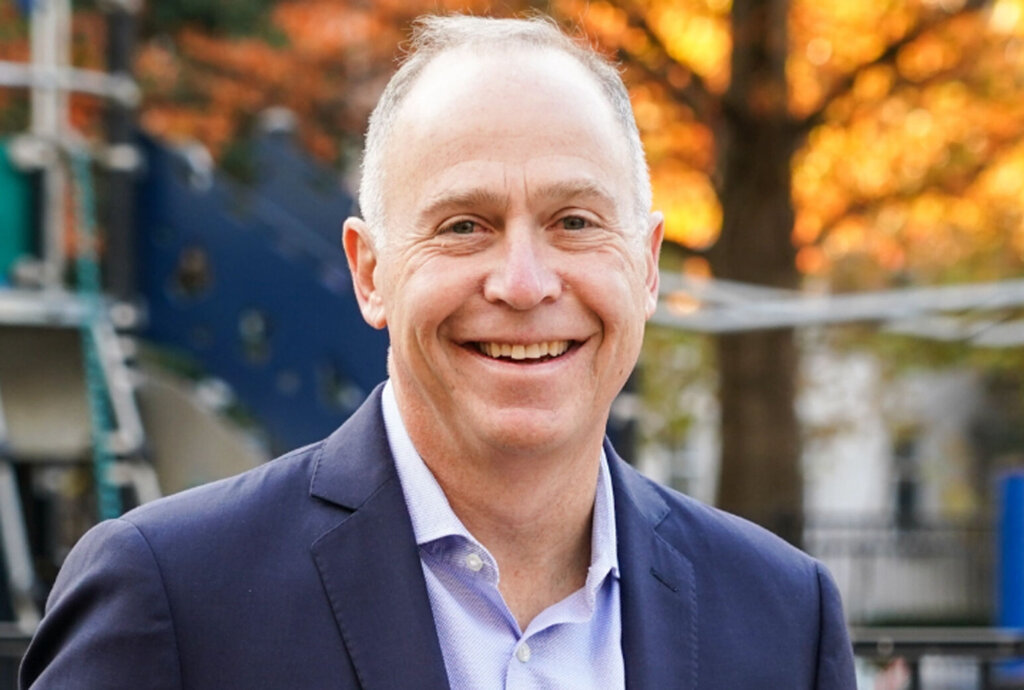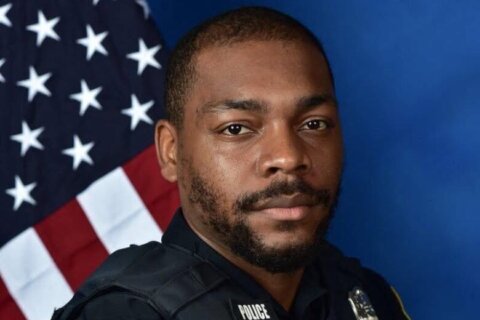This video is no longer available.
Karl Racine — the District’s first elected attorney general — isn’t running for reelection this year. Three Democrats are vying for the vote in D.C.’s June 21 primary: Ryan Jones, Brian Schwalb and Bruce Spiva.
Brian Schwalb is a third-generation Washingtonian, longtime trial lawyer and carries the endorsements of outgoing Attorney General Racine and previous attorney general, Irvin Nathan.
He spoke with WTOP’s Mike Murillo about the issues in this year’s race.
Editor’s note: This interview has been edited for clarity.
- Meet the candidates for DC attorney general and mayor
- DC primary voter guide
- Local Politics and Elections News
- More DC News

Who is Brian Schwalb?
I’m a third-generation Washingtonian. My grandfather was born here and my mother. I have three daughters who are now grown and they’re fourth-generation Washingtonians. I came back to Washington after law school and a clerkship to join the Justice Department in the Clinton Administration, and have been actively practicing law here in the District of Columbia ever since.
Why he’s the best person for the job
I think that being the attorney general for the District of Columbia requires a combination of three things that I think I uniquely bring to this role.
One is the years of lawyering and the breadth of lawyering experience. It’s a job that requires judgment, it requires making hard decisions in high-stakes matters. And having a breadth of experience, I’m the only candidate in this race who has tried hundreds of cases across the wide array of legal issues that come up.
I’ve defended people who were on death row in Alabama, and I’ve defended people who’ve been harmed by excessive force from the police. I’ve been involved in civil rights matters, suing the Maryland State Police for failing to disclose information.
But I’ve also been involved in complex commercial and civil matters across a wide array of legal issues involving real estate and breach of contract and bankruptcy and tax. I’ve represented individuals and corporations, nonprofit organizations and universities.
So I bring the breadth of legal experience. I’m the only candidate that was at the Department of Justice, has been a government attorney that has actually enforced the law and defended government.
I bring a long track record of leadership, which is the second thing that I think is essential to this job, because the Attorney General’s Office is an office of more than 700 professionals. I’ve been actively involved for more than a decade, not just recently, more than a decade leading Venable, first as our vice chairman, and over the last six years as the partner in charge of our D.C. office; hundreds of lawyers, hundreds of million-dollar budget. So that leadership experience coupled with the lawyering experience is really critical.
Finally, I’m independent. I’m not a politician. I never sought to be a politician. I’m a fair election candidate. My fundraising for this campaign has been totally transparent, and playing by the rules. And I think it’s the combination of that leadership, the lawyering and the independence that led our current AG, Karl Racine, and our former AG, Irv Nathan, to both endorse me. Both of those gentlemen know better than anybody what it takes to do this job and do it well.
Combating crime
As this campaign has gone on, more and more people that I talk to across the city talked about the fact that they don’t feel safe, whether it’s walking the dog, pumping gas, going to the store. When people don’t feel safe in their neighborhoods, we don’t get to all of the other really important things that government has to do in terms of making our communities healthier and more equitable.
I’ve got a six-point action plan about making neighborhoods safer and reducing crime; you can see it at saferdc.com. We have to address the phenomena of current uptick and certain crimes in our city, gun crimes by holding people accountable, making sure that we can close cases, working with MPD and the court system to make sure that we are actually holding people accountable. But because we’re talking about young people, we always have to make sure that we’re giving young people resources to rehabilitate, because our juvenile justice system is committed to rehabilitation.
Another piece of addressing crime now is working with our police, giving a real commitment to community policing, through transparency, through partnering our police with other resources that they need, oftentimes mental health or domestic violence professionals, to address crises.
But just as important as addressing current crime is really getting to the root causes that cause cycles of crime to begin with. And I want to be an advocate for the young people in our city. I don’t want to be a prosecutor that simply waits for kids to get into trouble so I can prosecute them.
I want to advocate; I want to shine a light on how we keep kids away from the criminal justice system by really investing in some of the root causes that keep kids healthy — and hopeful, because kids who have hope for their future care a lot about themselves and the people around them.
I want to invest in violence interruption to try to break cycles of trauma and retaliation and violence that cycle among themselves into people getting hurt too often. I think it’s just as important, as we address current crime, to also shine a light on: How do we prevent cycles of crime from starting in the first place?
Traffic safety
I’ve heard from a lot of folks around the city that, while they’re concerned about gun violence, they’re also very much concerned about traffic violence. There are certain direct actions that the attorney general can and, under my leadership, will take, in terms of holding reckless drivers and drunk drivers and speeders culpable. And we have to do more of that.
We also have to be a convener. The attorney general has the ability, as the chief law officer, the thought leader on issues of law and justice, to convene agencies and thought leaders in the District about: How do we engineer our roads differently? How do we educate better across the city on issues of traffic safety?
One of the issues I’m very interested in is making sure that we try to collaborate with our colleagues in Virginia and in Maryland, because we have way too many people who speed through our city and they don’t pay those tickets. We don’t have a reciprocity arrangement. And that’s one area that I want to spend some real hard energy, trying to create reciprocity with respect to our sister states, Maryland and Virginia.
Speed cameras
I think one of the things with speed cameras is that we end up taxing the people who live in the District of Columbia very heavily, and as I was suggesting just a moment ago, people who use our roads, but don’t have District of Columbia driver’s licenses, or plates, are escaping the obligation to pay for speeding tickets.
I’d also like to see us be very strategic about where those speed cameras are, because I think there’s a disproportionate impact on certain communities. And oftentimes, I’m hearing from people in the community that they think the speed cameras are at the wrong place. Once people know where the cameras are, they’re speeding where they aren’t. So I think we need to really look hard at the location of cameras, as well as the taxing impact.
We’ve got a clean hands statute in the District of Columbia, which I think needs to be amended. There’s some proposed amendments before the council that has the impact of unfairly taxing people and penalizing people who are poor, and were not able to pay the fines. It puts them in a terrible Catch-22 about getting their driver’s licenses renewed when they don’t have the funds to pay off fines. That’s another element of comprehensively looking at traffic and traffic enforcement to make our city safer and more equitable.
High-profile (Facebook/Amazon/Trump, etc.) cases
I think that when we’re talking about consumer protection cases, antitrust cases, there have to be two fundamental elements of any case that I would be in favor of bringing or pursuing.
One is, does it protect the residents of the District of Columbia? There are practices that are being engaged in nationally that very much have a negative impact on D.C. residents, and the fact that they’re national practices shouldn’t stop us from being in the forefront of fighting against them. I also think that there are national practices that are violative of the core principles that District of Columbia residents hold dear. I think when those types of cases are pending, wherever they might be in the country, I’m generally going to be in favor of continuing to fight for those. I think it’s important for the District of Columbia to be on the national stage, to be a thought leader.
And we, as residents of the District of Columbia, should be grateful that our current attorney general has made us a premier state Attorney General’s Office across the country. That’s good for all of us.
But I also want to be laser-focused on some very local consumer protection scams that too often affect D.C. residents uniquely. Many of our seniors are being financially exploited. Given the rising value of real estate in our city, we have real estate scams going on that are unique and local to D.C. And I think in those cases in particular, I’m going to be vigilant about using the consumer protection factor in the AG’s office to laser focus on the local types of consumer protection violations that are occurring far too often than they should.
Affordable housing
The reason affordable housing is such a critical focus for the Attorney General’s Office in the District of Columbia is that we have a real competitive advantage in Washington, D.C., in that so many people want to come and live here in our city. And that’s a good thing. We never want to be a city that people are fleeing away from.
But whenever you have a lot of demand for people to live in a location and not enough supply of good, high-quality housing, you’re gonna always have upward pressure on pricing.
So the attorney general in the District Columbia has to focus on: How do we make sure we preserve the existing housing stock? How do we make sure landlords are not allowing homes to fall into disrepair by not complying with our housing code?
We certainly need to aggressively pursue any landlord who’s engaging in constructive eviction or other slumlord tactics to try to force people out of their homes. Not only because it’s illegal, not only because it’s an affront to humanity to force them to live in those kinds of conditions, but purely to deal with our affordable housing issues, we need to make sure that those units remain in inventory and available for people to live.
We need to deal with a lot of the vacant housing. There’s way too much vacant housing in the District of Columbia that’s not effectively being taxed and brought back into circulation so people can live in those homes.
So both of those are important roles for the AG to play. The AG also has to play an important role with respect to development, because we have to always be a community that is open to investment, to people putting capital into our city and taking risks and building out the number of market and affordable units that are in our city for people to live in.
But a development community that is engaging with our city also has to be held accountable, and to make sure that they live up to the promises that are often made when they are getting the benefit of certain tax breaks or other opportunities to build in our city.
So I’m gonna make sure that we have good enforceable agreements, agreements that are clear, unambiguous, fair, and that have teeth in them so that we can make sure that once agreements are made on the front end, everybody lives up to them on the back end.
Did the barring of Kenyan McDuffie from the AG race cast a cloud?
I hope it doesn’t leave a cloud over the race, and I hope that we as a community get past it. But it’s a good reminder of how important judgment is in terms of making decisions on how to use the law.
Far too often, the law historically has been used to close doors on people, to close people out of opportunities, to compromise our democratic principles. And I think the law should be used to open doors and to create opportunity.
I was very much aware of the issues, and the questions that might be raised, and made the judgment that my campaign was going to try to take on council member McDuffie on the merits, bring the issue to the voters, for the voters to decide. I think that was the proper exercise of judgment.
An attorney general has to know that sometimes there are arguments that can be made, and that might be winnable, but nonetheless should not be made for precedential impact or community impact or other reasons.
So sometimes an attorney general needs to exercise the judgment not to make an argument.
What Schwalb would do differently from Racine
I think that AG Racine has done a terrific job as our first elected attorney general in terms of setting up the office, setting a high bar. I do want to focus on a couple of things that I think the office has not yet turned as aggressively to.
One is really with respect to small businesses and entrepreneurs, particularly Black-owned businesses that are oftentimes confronting barriers to entry.
We have a prosperous city with lots of opportunity. But too often, certain people in certain communities are left out of that prosperity.
We have a city now that’s roughly equal in terms of Black residents and white residents, yet the businesses in the city are owned 70% by white owners and only 13% by Black owners. There are discriminatory barriers to entry with respect to the cost of capital, cost of credit, insurance.
Oftentimes, those barriers to entry are implemented through algorithms and machine learning. And it’s going to be very important for the next AG to really dial in on some of those discriminatory barriers to entry to make sure everybody gets a chance to build wealth through homeownership, or through business ownership.
I also want to focus on the procurement process in our city. Too often, the concept of procurement and an opportunity for businesses to benefit from government dollars that are invested in the community are not fairly shared. And there’s a perception that some people are systematically kept out. I think those are two areas that the AG can really dial in on and I intend to dial in on those to make sure that our city becomes more equitable across the board.
- Meet the candidates for DC attorney general: Bruce Spiva
- Meet the candidates for DC attorney general: Ryan Jones








